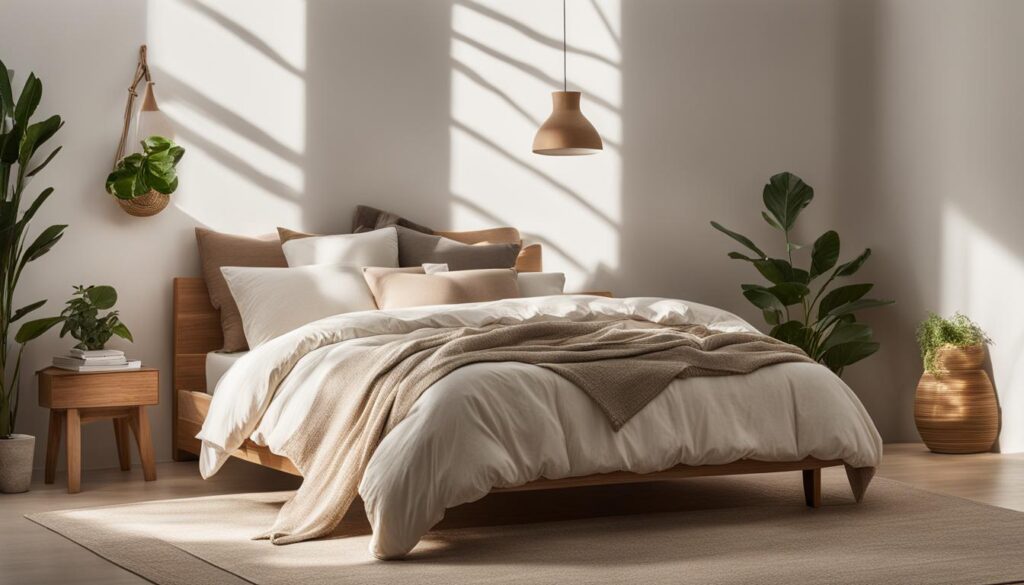Eco-Friendly Bedding Choices for a Greener, Healthier Sleep
Start sleeping better and sustainably—discover the best eco-friendly bedding choices that nurture both your skin and the planet, from organic cotton to bamboo and TENCEL™.
Why Go Green in the Bedroom?
Switching to eco-friendly bedding choices means you’re investing in your health, the environment, and ethical production. Here’s what’s at stake:
- Healthier Sleep: Avoid toxic chemicals and allergens with natural fibers.
- Environmental Sustainability: Save water, reduce emissions, and avoid synthetic waste.
- Ethical Production: Support fair labor practices and eco-conscious farming.
Want to go a step further? Pair your bedding with a sustainable bed frame—explore our guide to sustainable bed frames to complete your eco-friendly sleep setup.

Top Eco-Friendly Bedding Materials
Here are the best eco-friendly bedding choices—each material offers unique benefits when chosen properly:
Organic Cotton
Organic cotton is grown without harmful pesticides or fertilizers, making it safe for your skin and better for farmers. It’s soft, breathable, and certified via GOTS, which ensures rigorous environmental and social standards.
Bamboo (Lyocell/Modal)
Bamboo grows quickly and with minimal inputs. When processed responsibly into lyocell or modal, it becomes silky, breathable, and hypoallergenic—perfect for hot or sensitive sleepers.

Linen
Made from the flax plant, linen uses less water and fewer chemicals than cotton. It’s naturally antibacterial, long-lasting, and gets softer with every wash—ideal for people who value durability and a lived-in feel.
TENCEL™
Derived from sustainably sourced wood pulp, TENCEL™ uses a closed-loop process that recycles water and solvents. It’s cooling, soft, and highly absorbent—perfect for warm climates and eco-conscious sleepers.
Benefits of Eco-Friendly Bedding
- Temperature Regulation: Natural fibers help manage moisture and airflow for better sleep.
- Hypoallergenic: Resistant to dust mites and mold, making them ideal for sensitive skin.
- Durability: These materials age gracefully, resisting pilling and maintaining softness over time.
When you choose eco-friendly bedding choices, you’re opting for comfort, wellness, and sustainability in every sleep cycle. For personalized sleep support, consider pairing your bedding with a customizable adjustable bed that supports your lifestyle and posture.
Brands Leading the Way
These companies are making significant strides in sustainability:
- Coyuchi: Organic cotton, linen, zero-waste practices, and take-back recycling.
- Under the Canopy: Affordable GOTS-certified options and eco-packaging.
- West Elm: Fair Trade Certified™ lines using organic and TENCEL™ fabrics.
- Boll & Branch: Premium organic cotton bedding with a focus on ethics.
- Ettitude: Bamboo TENCEL™, B Corp Certified, soft and sustainable.
- Olive & Crate: TENCEL™ sheets known for cooling and softness.
Certifications to Look For
When shopping for eco-friendly bedding choices, look for these trusted labels:
- GOTS: Confirms organic textiles and ethical production.
- OEKO-TEX®: Verifies products are free from harmful substances.
- Fair Trade Certified™: Supports fair labor and wages.
- B Corp: Recognizes ethical and sustainable businesses.
These certifications help you make informed choices and trust the sustainability claims.
Creating Your Sustainable Sleep Sanctuary
Transform your space with intentional swaps and cozy upgrades:
- Replace conventional sheets with organic cotton or bamboo options.
- Add a linen duvet for breathability and charm.
- Use natural fiber pillows and organic mattress toppers.
- Pair with calming colors, plants, and soft lighting.
Looking to take it to the next level? Explore our guide on how to sleep your way with adjustable beds that complement your bedding and body.

FAQ
- What are eco-friendly bedding choices?
- Bedding made from sustainable, low-impact materials like organic cotton, bamboo, linen, and TENCEL™, often certified for safety and ethics.
- Is bamboo bedding really eco-friendly?
- Yes—especially when processed as bamboo lyocell in a closed-loop system. Look for OEKO-TEX or FSC-certified brands.
- Which materials are best for allergies?
- Organic cotton, bamboo, linen, and TENCEL™ are all hypoallergenic and great for sensitive sleepers.
- Do eco-friendly bedding options cost more?
- Sometimes upfront—but they last longer and offer better health and sustainability, making them a smart long-term investment.
- How do I care for eco-friendly bedding?
- Wash in cold water, use mild detergent, avoid bleach, tumble dry low or air dry, and follow label instructions.
Conclusion
Embracing eco-friendly bedding choices is a thoughtful step toward better sleep and a better planet. With so many beautiful, sustainable, and certified materials available, it’s never been easier to rest easy knowing you’re doing good for yourself and the world. Start small, and sleep deep—naturally.

